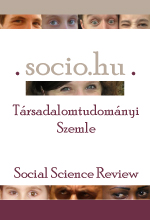Egy új világ építése egészen alulról?
Building a new world from the very bottom?
Local communities carrying out a complex sustainable alternative way of life in the Hungarian countryside
Author(s): András Takács-SántaSubject(s): Social Sciences, Human Ecology, Rural and urban sociology, Identity of Collectives
Published by: MTA TK Szociológiai Intézet
Keywords: community; ecovillage; local eco-community; alternative way of life
Summary/Abstract: Community-level responses to the ecological crisis have been sparse in Hungary so far. However, a few local communities were formed since 1989 in order to realize an alternative way of living, which is more ecological than that of the majority society. Our research group has been studying these ecological local communities for 8 years using in-depth interviews, participant observation and action research. According to our typology, these communities can be divided into two groups: the communities of ecovillages should be distinguished from the ones whose members are living as dispersed minorities in towns and villages. The aim of this study is to draw up some general patterns based on our observations of 12 ecological local communities. Our most important results are shown here and compared to the observations of other domestic and foreign investigations. Our results show that almost all of the members of these communities are graduates who have moved from the city to the countryside. Environmental consciousness is only one of their several motivations to realize an ecological way of living. They are still only partially able to live off local, environmentally benign economic activities. They aim to revive traditions and have a critical stance towards modernity. Their opposition to the dominant culture is, for instance, reflected in the fact that they usually school their children in alternative ways. However, the soon coming collapse of the dominant culture is a frequent belief among them. In the successful communities a common religion is often an important glue. Miscellaneous forms of leadership can be found in these communities, but nearly all of them are battling with problems in this respect. They are usually open to the outer world and try to be a standard for others. Their relationship with native locals, however, is generally cold. Hungarian ecological local communities basically do not differ from those located in other core countries.
Journal: Socio.hu Társadalomtudományi Szemle
- Issue Year: 6/2016
- Issue No: 4
- Page Range: 73-99
- Page Count: 27
- Language: Hungarian

